|
Career / life vision and guidance from Peter Drucker
This page needs editing
This page is divided into five main parts:
 The Sweep of History and Thinking about Time Usage The Sweep of History and Thinking about Time Usage
 Basic career and life structures Basic career and life structures
 Thinking, questions, topic work, and an action system Thinking, questions, topic work, and an action system
 Landscape awareness Landscape awareness
 Individual guidance Individual guidance
The concepts and ideas contained in the material below will have to be identified, labeled, harvested, integrated, and sequenced to be really useful.
All of these share a common assumption: life-time employment no longer exists. Its your responsibility to navigate to your futureS in the worldS of tomorrowS.
Nobody else can or will do it for you.
This is attention-directing work — ecological exploration.
Try to see the long-term value in this work.
You should not be trying to arrive at a concrete answer because we are embedded in an unpredictable world.
The Sweep of History and Thinking about Time Usage
There are some basic structures involved: a knowledge specialty ::: managing oneself (Josh Abrams story below) ::: taking on assignments that fit you and your competencies ::: the second half of your life.
Beware of jumping to conclusions. The human brain is always looking backwards and trying make sense as fast as it can.
Many highly intelligent people use their thinking
to back up or defend their immediate judgement of a matter.
… a perception-broadening tool (attention-directing)
forces a thinker to explore the situation
before coming to a judgement — Edward de Bono
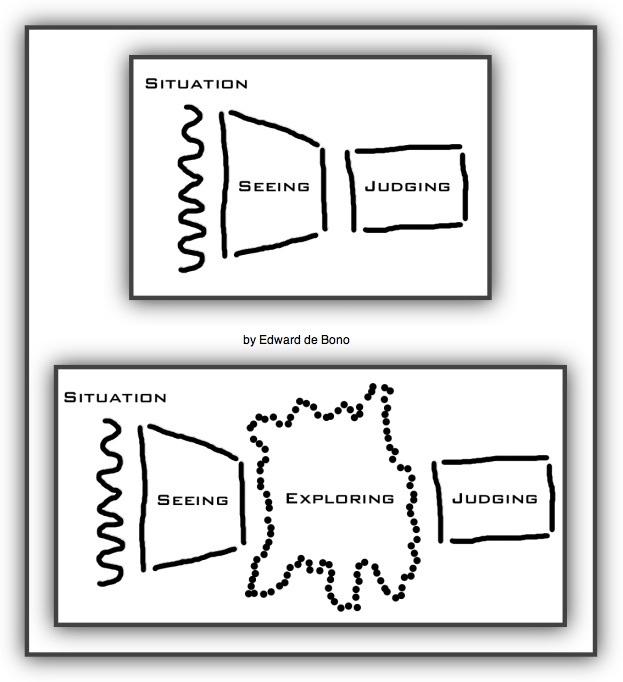
“To know something,
to really understand something important,
one must look at it from sixteen different angles.
People are perceptually slow,
and there is no shortcut to understanding;
it takes a great deal of time.” read more
Attention directing is exploring
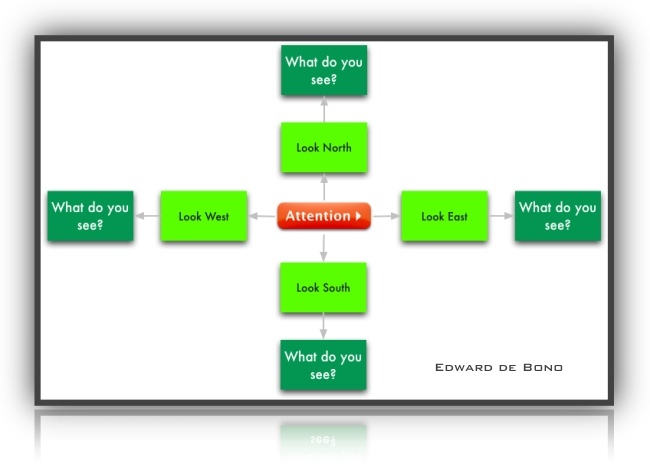
Questions are attention directing tools
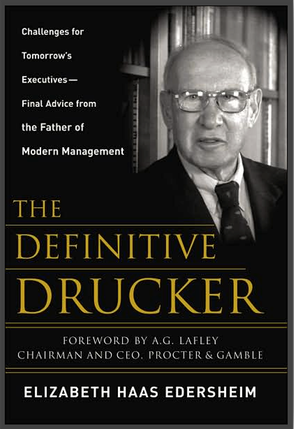
Questions in The Definitive Drucker.
Social ecologists try to find the right questions
Using your ignorance to your benefit
What impact might an educated person add to the thinking?
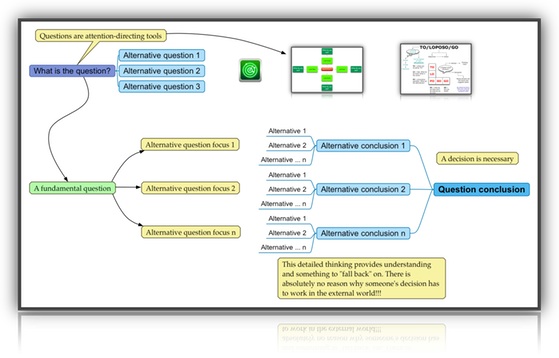
Larger
Effectively working on questions
requires a
foundation for future directed decisions
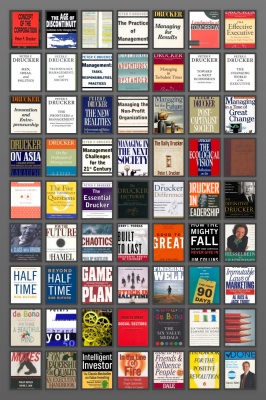
Sometimes alternative answers
need to be combined
to create an effective “constellation.”
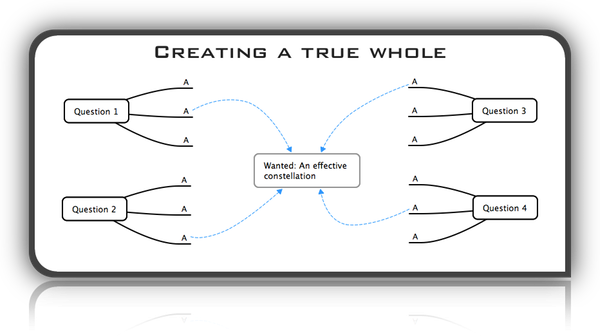
Larger

Dense reading and Dense listening
A tool for harvesting, collecting, and organizing “information”
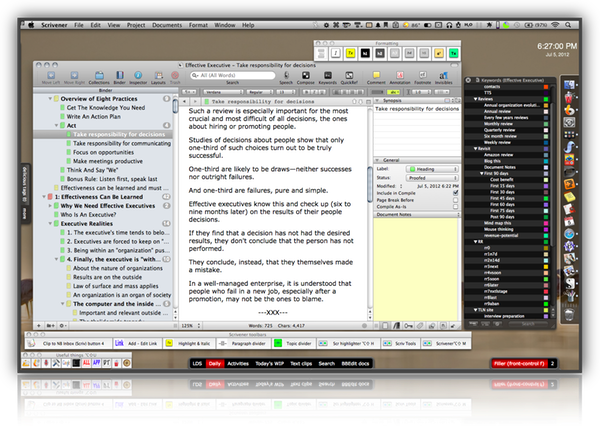
Larger ::: Scrivener
Larger view of challenge thinking and an alternative — operacy
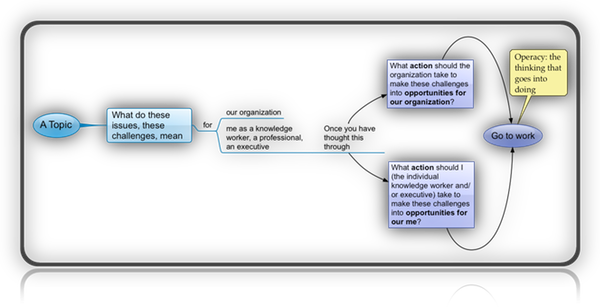
Dense reading and Dense listening
and Thinking broad and Thinking detailed
by Edward de Bono
Google site search: asking right questions
See Drucker books for more questions
Every question (see illustration above) or topic could have several thinking canvases …
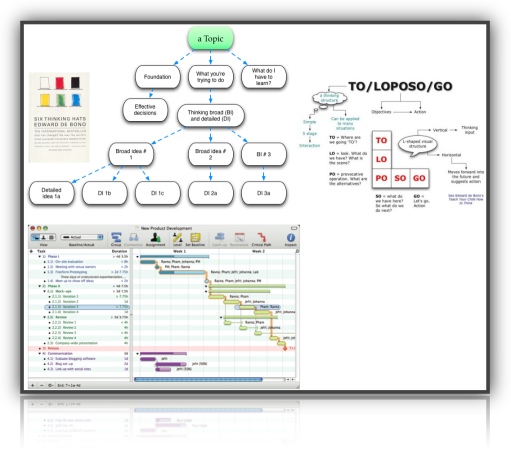
Larger
A bigger system
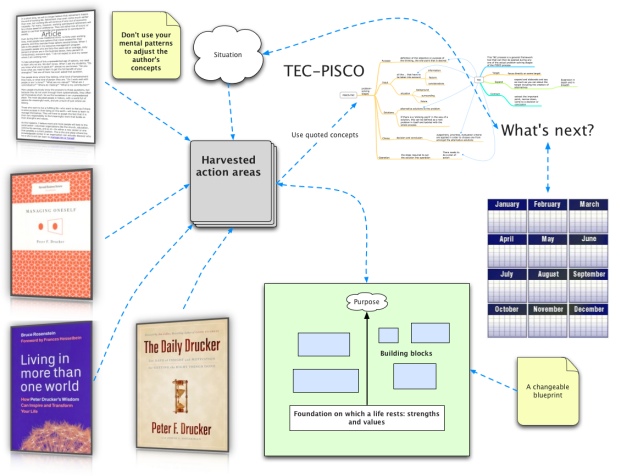
Larger
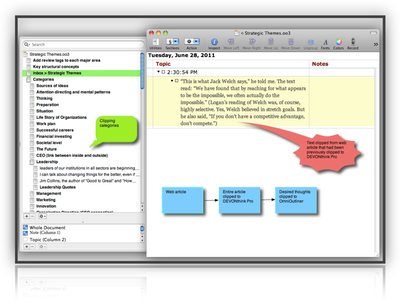
Radar system and radar list
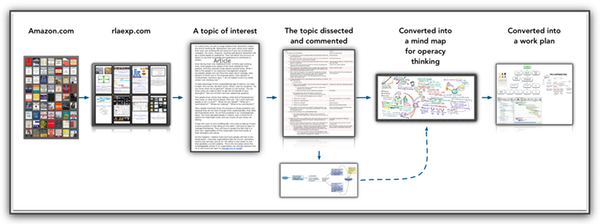
Larger

Landscape awareness:
Society of organizations, management, true marketing and individual roles
Chapter 13, Management, Revised Edition: … Finally, successful nonprofits know how to manage volunteers.
Managing volunteers requires a clear mission, careful placement, continuous learning and teaching, management by objectives and self-control, high demands but corresponding responsibility, and accountability for performance and results.
The 90/10 Rule at Yum! Brands
But every analysis of actual allocation of resources and efforts in business that I have ever seen or made showed clearly that the bulk of time, work, attention, and money first goes to 'problems' rather than to opportunities, and, secondly, to areas where even extraordinarily successful performance will have minimal impact on results. (calendarize this?)
One of the hardest things for a manager to remember is that of the 1,000 different situations he or she will be asked to deal with on any given day, only the smallest handful have a shot at moving the enterprise forward in a truly significant way (calendarize this?)
The job of management, then, is to make sure that financial capital, technology, and top talent are deployed where most of the results are and where most of the costs aren't. The temptation often exists, however, to do exactly the opposite
See chapter 10, The Bright Idea (the riskiest and least successful source of innovative opportunities) in Innovation and Entrepreneurship
Broken Washroom Doors: Drucker said the problem of having people in positions where they do the least amount of good exists everywhere, but it is more rampant in hospitals, churches, and other nonprofits than in corporations.
To raise productivity in most any organization managers should regularly assess their key people, their strengths, and the results they achieve.
Then they should ask themselves:
Do we have the right people in the right jobs, where they can make the greatest contributions?
Are the jobs the right ones, meaning do we have people performing tasks that even if achieved do not add value to the organization?
What changes in people, jobs, and job functions can we make that will yield greater results?
Inside Drucker's Brain
Competition on the roads ahead
… In the new mental geography created by the railroad, humanity mastered distance.
In the mental geography of e-commerce, distance has been eliminated.
There is only one economy and only one market.
One consequence of this is that every business must become globally competitive, even if it manufactures or sells only within a local or regional market.
The competition is not local anymore—in fact, it knows no boundaries.
Every company has to become transnational in the way it is run.
Yet the traditional multinational may well become obsolete.
It manufactures and distributes in a number of distinct geographies, in which it is a local company.
But in e-commerce there are neither local companies nor distinct geographies.
Where to manufacture, where to sell, and how to sell will remain important business decisions.
But in another twenty years they may no longer determine what a company does, how it does it, and where it does it.
At the same time, it is not yet clear what kinds of goods and services will be bought and sold through e-commerce and what kinds will turn out to be unsuitable for it.
This has been true whenever a new distribution channel has arisen.
Why, for instance, did the railroad change both the mental and the economic geography of the West, whereas the steamboat—with its equal impact on world trade and passenger traffic—did neither?
Why was there no "steamboat boom"?
Equally unclear has been the impact of more recent changes in distribution channels—in the shift, for instance, from the local grocery store to the supermarket, from the individual supermarket to the supermarket chain, and from the supermarket chain to Wal-Mart and other discount chains.
It is already clear that the shift to e-commerce will be just as eclectic and unexpected. …
Managing in the Next Society
by Peter Drucker
Characteristics of the Next Society
Every institution in the knowledge society has to be globally competitive.
The next society will be a knowledge society. Its three main characteristics will be:
 Borderlessness, because knowledge travels even more effortlessly than money. Borderlessness, because knowledge travels even more effortlessly than money.
 Upward mobility, available to everyone through easily acquired formal education. Upward mobility, available to everyone through easily acquired formal education.
 The potential for failure as well as success. Anyone can acquire the “means of production,” that is, the knowledge required for the job, but not everyone can win. The potential for failure as well as success. Anyone can acquire the “means of production,” that is, the knowledge required for the job, but not everyone can win.
Together, those three characteristics will make the knowledge society a highly competitive one, for organizations and individuals alike.
Information technology, although only one of many new features of the next society, is already having one hugely important effect:
it is allowing knowledge to spread near—instantly, and making it accessible to everyone.
Given the ease and speed at which information travels, every institution in the knowledge society—not only businesses, but also schools, universities, hospitals, and increasingly, government agencies, too—has to be globally competitive, even though most organizations will continue to be local in their activities and in their markets.
This is because the Internet will keep customers everywhere informed on what is available anywhere in the world, and at what price
May 4, The Daily Drucker
 The New Productivity Challenge and chapter 19 in Management, Revised Edition (work landscape awareness) The New Productivity Challenge and chapter 19 in Management, Revised Edition (work landscape awareness)
 Toward New Organizations and find "Part I: Management's New Realities" in Management: Revised Edition (work landscape awareness) Toward New Organizations and find "Part I: Management's New Realities" in Management: Revised Edition (work landscape awareness)
 Outsourcing (a radar blip) Outsourcing (a radar blip)
 Knowledge: Its Economics and Its Productivity Knowledge: Its Economics and Its Productivity
Individual guidance:
 About knowledge specialty About knowledge specialty
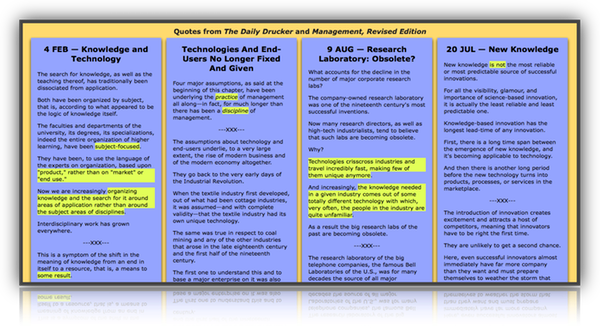
It is the very nature of knowledge
that it changes fast and
that today's certainties
will be tomorrow's absurdities. — Peter Drucker
Larger
 The World is Full of Options (dissect, harvest, and calendarize?) The World is Full of Options (dissect, harvest, and calendarize?)
 The Wisdom of Peter Drucker by Bob Buford (dissect, harvest, and calendarize?) The Wisdom of Peter Drucker by Bob Buford (dissect, harvest, and calendarize?)
 Ten Principles for Life II (dissect, harvest, and calendarize?) Ten Principles for Life II (dissect, harvest, and calendarize?)
 Peter's Principles (dissect, harvest, and calendarize?) Peter's Principles (dissect, harvest, and calendarize?)
 Josh Abrams story (dissect, harvest, and calendarize?) Josh Abrams story (dissect, harvest, and calendarize?)
Of all the people that Drucker came across in his life why did he single out Josh Abrams?
 Peter Drucker: My Life as a Knowledge Worker (dissect, harvest, and calendarize?) Peter Drucker: My Life as a Knowledge Worker (dissect, harvest, and calendarize?)
 Strive for perfection … Strive for perfection …
 … perfection … even if only the gods notice … perfection … even if only the gods notice
 Know something about many subjects (and their synthesis) Know something about many subjects (and their synthesis)
 Review work during the preceding year, beginning with the things I did well but could or should have done better, down to the things I did poorly and the things I should have done but did not do. I decide what my priorities should be in my consulting work, in my writing, and in my teaching … Review work during the preceding year, beginning with the things I did well but could or should have done better, down to the things I did poorly and the things I should have done but did not do. I decide what my priorities should be in my consulting work, in my writing, and in my teaching …
 New job: What should I be doing now, to be effective in my new job? New job: What should I be doing now, to be effective in my new job?
 Anything of significance—making a key decision, for instance—write down what results he anticipates. Nine months later he traces back from the actual results to those anticipations. Learn … Anything of significance—making a key decision, for instance—write down what results he anticipates. Nine months later he traces back from the actual results to those anticipations. Learn …
 Ask oneself what one wants to be remembered for Ask oneself what one wants to be remembered for
 The Individual In Entrepreneurial Society (dissect, harvest and calendarize?) The Individual In Entrepreneurial Society (dissect, harvest and calendarize?)
 Interview: Post-Capitalist Executive (dissect, harvest, and calendarize?) Interview: Post-Capitalist Executive (dissect, harvest, and calendarize?)
Q: How does one prepare for this new kind of managerial career?
A: Being an educated person is no longer adequate, not even educated in management.
One hears that the government is doing research on new job descriptions based on subject knowledge.
But I think that we probably have to leap right over the search for objective criteria and get into the subjective—what I call competencies.
Do you really like pressure?
Can you be steady when things are rough and confused?
Do you absorb information better by reading, talking, or looking at graphs and numbers?
I asked one executive the other day, "When you sit down with a person, a subordinate, do you know what to say?" Empathy is a practical competence.
I have been urging this kind of self-knowledge for years, but now it is essential for survival.
People, especially the young, think that they want all the freedom they can get, but it is very demanding, very difficult to think through who you are and what you do best.
In helping people learn how to be responsible, our educational system is more and more counterproductive.
The longer you stay in school, the fewer decisions you have to make.
For instance, the decision whether to take French II or Art History is really based on whether one likes to get up early in the morning.
And graduate school is much worse.
Do you know why most people start with big companies?
Because most graduates have not figured out where to place themselves, and companies send in the recruiters.
But as soon as the recruits get through training and into a job, they have to start making decisions about the future.
Nobody's going to do it for them.
And once they start making decisions, many of the best move to mid-size companies in three to five years, because there they can break through to top management.
With less emphasis on seniority, a person can go upstairs and say, "I've been in accounting for three years, and I'm ready to go into marketing."
Each year I phone a list of my old students to see what's happening with them.
The second job used to be with another big company, often because people were beginning to have families and wanted security.
But with two-career families, a different problem emerges.
At a smaller organization, you can often work out arrangements for both the man and the woman to move to new jobs in the same city.
 Interview: Managing in a Post-Capitalist Society (dissect, harvest, and calendarize?) Interview: Managing in a Post-Capitalist Society (dissect, harvest, and calendarize?)
 Managing Knowledge Means Managing Oneself on the The Frances Hesselbein Leadership Institute (formerly Leader to Leader Institute) site and Managing Oneself (the book). Managing Knowledge Means Managing Oneself on the The Frances Hesselbein Leadership Institute (formerly Leader to Leader Institute) site and Managing Oneself (the book).
Archimedes, one of the great scientists of antiquity, is reported to have said: "Give me a place to stand on, and I can lift the universe off its hinges." Managing oneself is a place to stand—sort of …
See the September entries in The Daily Drucker
 Chapter 26 From Middle Management to Information-Based Organizations in Management, Revised Edition for important clues for career expectations. Chapter 26 From Middle Management to Information-Based Organizations in Management, Revised Edition for important clues for career expectations.
These expectations should also be informed and shaped by the theory of the business; Part I: Management's New Realities; the final new paradigm (Management's concern and management's responsibility are everything that affects the performance of the institution and its results — whether inside or outside, whether under the institution's control or totally beyond it); chapter 44 The Impact of Pension Funds on Corporate Governance) and …
 Managing the Boss Managing the Boss
 Most Of Us Have More Than One Boss Most Of Us Have More Than One Boss
And the trend is for knowledge workers to have an increasing number of bosses, an increasing number of people on whose approval and appraisal they depend, and whose support they need.
 The Boss Is Key To Effectiveness The Boss Is Key To Effectiveness
No matter how good the knowledge worker’s work, if the boss does not act on it, nothing will happen, nothing will get done
Also—though rarely mentioned in polite society—there are few things quite as helpful to one’s own career as a boss who goes places.
Everybody knows these things, but almost no one does anything about them.
 Neglect Of Managing The Boss Neglect Of Managing The Boss
Most of the management books and management seminars are still caught in a definition of a manager that has actually been obsolete for decades
 Who Is The Boss? Who Is The Boss?
We have known—I’d say since the 1950s—that a manager or executive is somebody who is responsible for the work of all the people besides himself on whom the manager’s own performance depends.
And surely the first one of these is the boss.
 Managing the Boss Managing the Boss
 Making a “boss list” Making a “boss list”
Put down on a piece of paper everyone to whom you are accountable, everyone who can direct you or your people, everyone who appraises you and your work and is expected to have an opinion about you and your performance, everyone on whom you depend to make effective your work and that of your people.
 The three types of intelligence from The Prince by Niccolò Machiavelli The three types of intelligence from The Prince by Niccolò Machiavelli
 Types of behavior that can be observed … along with arrogance, apathy, complacency Types of behavior that can be observed … along with arrogance, apathy, complacency
 What Got You Here Won't Get You There What Got You Here Won't Get You There
And revise that list once a year and always when your job or your assignment changes.
It is unlikely to be the same list for longer than a year or so.
Altogether, to define a boss in legal terms is much too narrow; the boss list defines a boss in operational terms.
A boss is anyone who has the power and anyone who is likely—let alone certain—to be listened to when he or she has an opinion about you, your performance, your work, your competence and qualifications.
It is better to have a few more people on the boss list and then take them off than to leave off people who should have been on it.
Each manager should ask, “Who should be on my boss list?”
And the list should include not only specific people, but also the roles and types of people who should be on the list.
 Asking each for his or her input, and giving each your own input Asking each for his or her input, and giving each your own input
 Enabling bosses to perform Enabling bosses to perform
 Playing to the bosses’ strengths Playing to the bosses’ strengths
 Keeping bosses informed Keeping bosses informed
 Protecting bosses from surprises Protecting bosses from surprises
 Never underrating bosses Never underrating bosses
Chapter 46, Management, Revised Edition
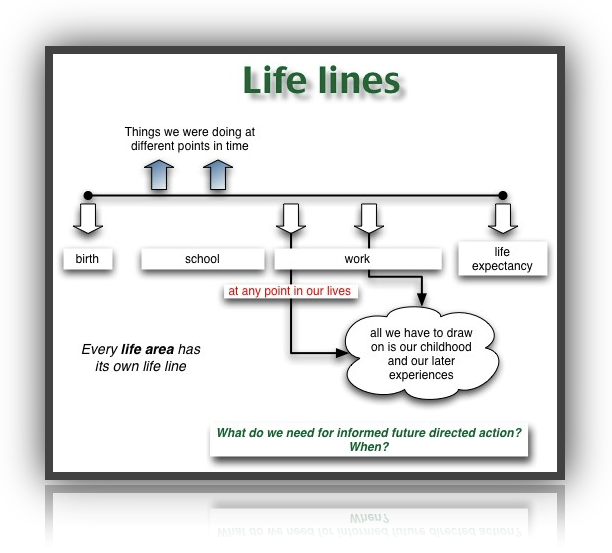
Life lines exist in a changing world
 Components for designing a harvesting and implementation system (part of a radar system) Components for designing a harvesting and implementation system (part of a radar system)
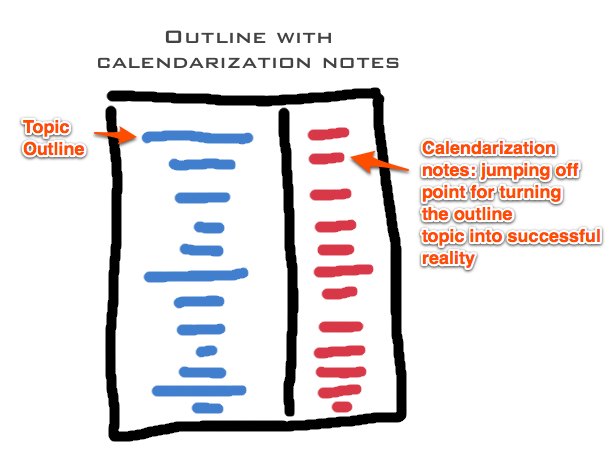
Calendarization. When I run across something that I want to explore, I break the sentences into separate paragraphs and create a hierarchical structure — Management's New Paradigms example

TEC-PISCO
Larger view
 Major life directions: What do you want to be remembered for? Major life directions: What do you want to be remembered for?
|
![]()

![]()